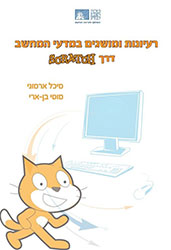
|
FreeComputerBooks.com
Links to Free Computer, Mathematics, Technical Books all over the World
|
|
- Title Computer Science Concepts in Scratch
- Author(s)Michal Armoni and Moti Ben-Ari
- Publisher: Weizmann Institute of Science. (2013)
- License(s): CC BY-NC-ND 3.0
- Hardcopy: N/A
- eBook: PDF (230 pages)
- Language: English
- ISBN-10: N/A
- ISBN-13: N/A
- Share This:

|
This book will familiarize you with the Scratch visual programming environment, focusing on using Scratch to learn computer science. The book is structured as a collection of tasks. Each chapter teaches a new concept, but the concept is introduced in order to solve a specific task such as animating dancing images or building a game.
Each chapter starts with a simple task, but as soon as we solve one task, we add additional tasks to extend the existing task. The sequence of tasks will require a new construct of Scratch or the use of constructs you know in new ways.
About the Authors- Dr. Michal Armoni is Principal Investigator in Dr. Karl and Leila Ribstein Center for Information Technology at Weizmann Institute of Science.
- Prof. Mordechai (Moti) Ben-Ari has been on the faculty of the Department of Science Teaching at the Weizmann Institute of Science since 1995.
- Introduction to Computer Science
- Scratch Programming
- The C and Objective C Programming
- Discrete and Finite Mathematics
- Computer Science Books
 Similar Books:
Similar Books:
-
 Computer Science from the Bottom Up - From Operating Systems
Computer Science from the Bottom Up - From Operating Systems
It aims to teach computer science from the bottom end up - working from operating systems fundamentals through to how those applications are complied and executed, so you might be able to figure out where to start looking to make sense of it all.
-
 Philosophy of Computer Science (William J. Rapaport)
Philosophy of Computer Science (William J. Rapaport)
This book concentrates on a tightly related group of topics which form the spine of the subject. These include specification, implementation, semantics, programs, programming, correctness, abstraction and computation.
-
 Foundations of Computation (Carol Critchlow, et al)
Foundations of Computation (Carol Critchlow, et al)
It includes topics from discrete mathematics, automata theory, formal language theory, and the theory of computation, along with practical applications to computer science. The course has no prerequisites other than introductory computer programming.
-
 Building Blocks for Theoretical Computer Science (Margaret Fleck)
Building Blocks for Theoretical Computer Science (Margaret Fleck)
For all readers interested in the basics of computer science. It provides a survey of basic mathematical objects, notation, and techniques which will be useful in later computer science courses.
-
 CS for All: An Introduction to Computer Science using Python
CS for All: An Introduction to Computer Science using Python
To provide an introduction to computer science as an intellectually rich and vibrant field rather than focusing exclusively on computer programming. It emphasizes concepts and problem-solving over syntax and programming language features.
-
 Computer Science Tapestry: Exploring Programming in C++
Computer Science Tapestry: Exploring Programming in C++
This book is designed for a first course1 in computer science that uses C++ as the language by which programming is studied. It provides strong grounding in the analysis, construction, and design of programs and programming.
-
 Concrete Abstractions: An Intro to Computer Science Using Scheme
Concrete Abstractions: An Intro to Computer Science Using Scheme
This book covers the basics of programming and data structures, and gives first-time computer science students the opportunity to not only write programs, but to prove theorems and analyze algorithms as well.
-
 Foundations of Computer Science, C Edition (Al Aho, et al)
Foundations of Computer Science, C Edition (Al Aho, et al)
This textbook combines the theoretical foundations of computing with essential discrete mathematics. It shows you how to use such essential data structures as lists, stacks, queues, sets, trees, heaps, priority queues, and graphs.
-
 How to Think Like a Computer Scientist: JAVA Programming
How to Think Like a Computer Scientist: JAVA Programming
This book is an introduction to Java programming for beginners. It is tailored for students preparing for the Computer Science Advanced Placement (AP) Exam, but it is for anyone who wants to learn Java.
-
 Scratch Programming Playground: Making Cool Games
Scratch Programming Playground: Making Cool Games
Scratch, the colorful drag-and-drop programming language, is used by millions of first-time learners, and in this book, you'll learn to program by making cool games. Get ready to destroy asteroids, shoot hoops, and slice and dice fruit!
-
 Learn to Code with Scratch (The MagPi Team)
Learn to Code with Scratch (The MagPi Team)
Help you get started and guide you step-by-step through the process of creating all sorts of projects: games, animations, quizzes, electronics circuits, and more. You'll find that Scratch isn’t just a great way to learn to code, but lots of fun too!
-
 Code Club Book of Scratch (Rik Cross, et al.)
Code Club Book of Scratch (Rik Cross, et al.)
You'll learn how to code using Scratch, the block-based programming language. You'll find instructions to build cool games, animations, and interactive stories. Your friendly robot guide will aid you step-by-step through each project.
-
 Coding for Kids: Scratch (Stuart Andrews, et al.)
Coding for Kids: Scratch (Stuart Andrews, et al.)
Read it, follow the projects and get to grips with the fundamentals of programming, and you and they can learn to code. The projects in this book are fun, so that kids and adults will enjoy making them, and playing them once they are done.
-
 Creative Computing Curriculum using Scratch (Christan Balch, et al.)
Creative Computing Curriculum using Scratch (Christan Balch, et al.)
A collection of ideas, strategies, and activities for an introductory creative computing experience using the Scratch programming language. Designed to support familiarity and increasing fluency with computational creativity and computational thinking.





